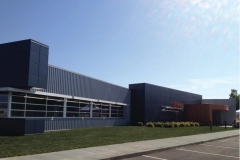Zayo Partners with U.S. National Laboratories and Rice University to Deliver Groundbreaking Research that Uncovers New Sustainable Energy Sources
Zayo Partners with U.S. National Laboratories and Rice University to Deliver Groundbreaking Research that Uncovers New Sustainable Energy Sources
The Imperial Valley Dark Fiber Project used Zayo’s dark fiber infrastructure to map undiscovered geothermal resources critical for clean energy production
BOULDER, Colo. – Zayo Group Holdings, Inc., a global communications infrastructure provider, announced the completion of the Imperial Valley Dark Fiber Project-a collaborative research effort between Lawrence Berkeley National Laboratory and Rice University and funded by the U.S. Department of Energy-to explore the efficacy of leveraging telecommunications fiber to map and monitor geothermal resources that could enable a low carbon energy future.
The Challenge
Berkeley Lab and the DOE have been exploring geothermal energy as a renewable alternative to fossil fuels for decades. Clean energy sources like geothermal energy are necessary for producing sustainable energy, reducing emissions, and addressing climate change. However, these resources are often hidden – meaning there is no resource surface expression – and mapping these geothermal resources was historically labor intensive and often cost prohibitive.
The Imperial Valley Dark Fiber Project, which kicked off in 2019, sought to develop strategies to better find these resources through seismic sensing via existing telecom dark fiber.
Why Dark Fiber
The Berkeley Lab-Rice team, in collaboration with scientists from Lawrence Livermore National Laboratory and Scripps Institution of Oceanography, used Zayo’s dark fiber network in the Imperial Valley of California-an area already known to be home to many hidden geothermal resources-to test various techniques for mapping geothermal resources. These methods include Distributed Acoustic Sensing (DAS), a technique that turns Zayo’s dark fiber into an array of seismic measurement locations to build a picture of what is underground.
In a conventional seismic experiment, only a few seismic sensors can be deployed in one small, targeted area. This often requires significant time for sensor deployment and permitting, while resulting in the use of just a few dozen sensors. Using existing dark fiber, however, significantly reduces deployment time and increases the number of sensors to thousands. With dark fiber, researchers have access to tens of kilometers of fiber and can measure every few meters, offering unprecedented access that was previously cost prohibitive.
“Our future as a nation relies on uncovering new ways to fuel our society, and while solar or wind energy alternatives often take the spotlight, the value of geothermal energy production is becoming more apparent,” said Dr. Jonathan Ajo-Franklin of Rice University, one of the researchers on the project. “But geothermal research takes an incredible amount of collaboration. Zayo’s fiber infrastructure and expertise were a significant benefit to our team’s research. This isn’t a typical telecom project; it requires equipment with capabilities that other projects do not have, and technical guidance to support our team in making decisions relevant to deploying the fiber.”
The Findings
By fusing dark fiber with traditional seismic sensors, the Berkeley Lab-Rice team has built larger, more detailed maps of the subsurface. Researchers have also leveraged Zayo’s dark fiber to test additional applications, including earthquake detection. Findings from the project have been published in numerous scholarly articles.
“Network infrastructure is at the heart of innovation, and that couldn’t be more true than it is with this project,” said Steve Smith, CEO of Zayo. “We are proud to have played a role in advancing the discovery and development of clean energy sources, in keeping with our longstanding commitment to drive a sustainable future. We hope the great work of the Berkeley Lab and Rice University team will inspire new conversations about how fiber infrastructure can be leveraged in new ways to make a positive impact on our future – some that we can only imagine today.”
To learn more about Zayo’s collaboration on the Imperial Valley Dark Fiber project, visit https://www.zayo.com/resources.
About Zayo
For more than 15 years, Zayo has empowered some of the world’s largest and most innovative companies to connect what’s next for their business. Zayo’s future-ready network spans over 17 million fiber miles and 142,000 route miles. Zayo’s tailored connectivity and edge solutions enable carriers, cloud providers, data centers, schools, and enterprises to deliver exceptional experiences, from core to cloud to edge. Discover how Zayo connects what’s next at www.zayo.com and follow us on LinkedIn and Twitter.
View source version on businesswire.com: https://www.businesswire.com/news/home/20231207172693/en/
Sam Perry
BLASTmedia for Zayo Group
zayogroup@blastmedia.com
More >> Zayo Partners with U.S. National Laboratories and Rice University to Deliver Groundbreaking Research that Uncovers New Sustainable Energy Sources


